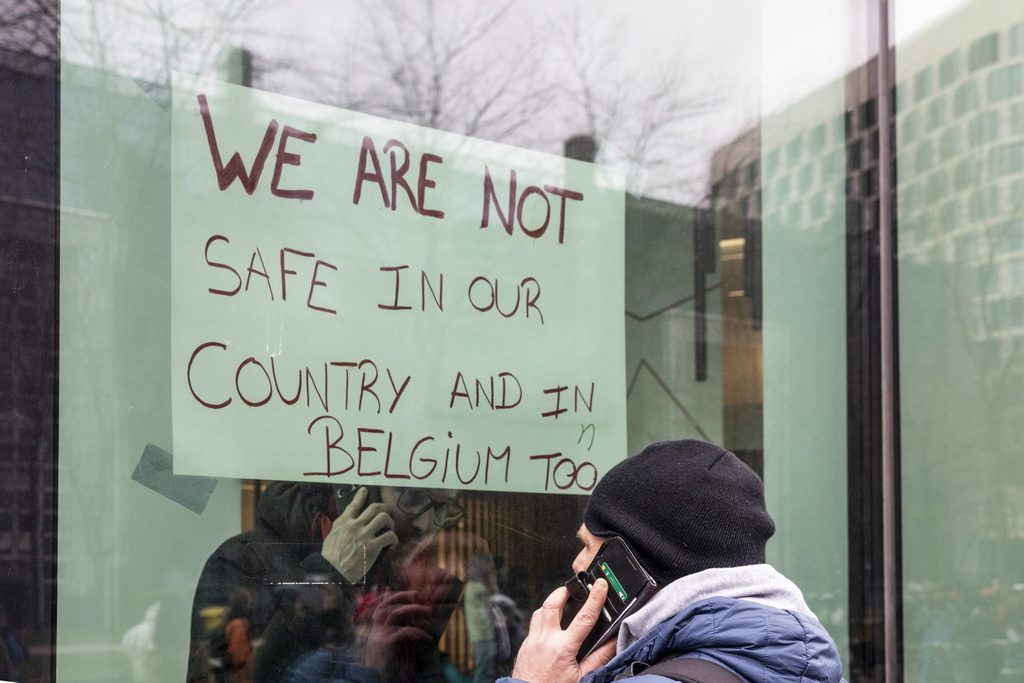Two years and more than 8,500 convictions later, Belgium is no closer to solving the asylum reception crisis, which is resulting in some male refugees sleeping rough for as long as 10 months in very challenging conditions.
While the situation of Belgium's dysfunctional asylum reception network this autumn is arguably not as harrowing as this time last year – when the shortage of reception places resulted in a number of families with children and unaccompanied minors being sent to the streets in what was described as a humanitarian crisis – the present state of affairs is hardly cause for celebration.
"The situation is the same as it has been for the past two years. Families with minors and women can access the reception network and apply for asylum without any problem. They will likely be able to do so provided there are just enough reception volunteers," Thomas Willekens of Vluchtelingenwerk Vlaanderen (Refugee Council Flanders) told The Brussels Times.
"But single men are still left out: they still don't receive reception on the day of their asylum application and on busy days at the Immigration Department they cannot always immediately submit their asylum applications."
Battling the backlog
Asylum seekers who are not immediately given a sheltered place in the reception network are added to the waiting list. Currently, this list is around 2,600 people long – up from 2,300 in September despite a task force being created to tackle it and Federal Government proposals to resolve the issue.
At the end of August, State Secretary for Asylum and Migration Nicole de Moor announced Belgium would temporarily stop providing shelter to single men applying for asylum. This was intended to ensure that families and children always receive a place.
Whilst de Moor maintains that this measure is in place, Willekens notes that vulnerable single men are being invited into the reception network, as has been confirmed by reports by De Morgen.
"The longer these men are left waiting, the more vulnerable they become. It makes sense that they are still being invited by Fedasil," Willekens said. Between 10 and 20 men are offered a place every day, but they often don't get a response from those who are offered shelter. "This is either because they have disappeared or they don't have the means to receive the invitation."

A banner reading "asylum seekers still without shelter, the only culpable party is the state" at a protest against de Moor's decision at the end of August. Credit: Lauren Walker/The Brussels Times
While single men are still taken into the reception network, the number of people on the waiting list keeps growing. De Moor's decision to exclude single men was overruled by the Council of State, though she accepted that even with it in force, this wouldn't guarantee space for everyone.
Willekens criticised the perceived lack of accountability of the government: the fact that Fedasil and/or the Belgian State has received 8,500 convictions by the Labour Court for not providing people with shelter seems to have changed little in the national response.
"This sends the signal that it doesn't matter if they pay a fine, they will get away with it anyway. It also sends the same signal to the next government that they can get away with this."
Failure at every level
To demonstrate the extent of the problem, Willekens points to some cases that applied for asylum in February this year but only now are being processed by Fedasil, meaning these people went ten months without a secure place to stay. The agency also noted that 1,300 people have been granted asylum while still on the waiting list, meaning they did not receive shelter throughout their entire application procedure.
It is not entirely clear where the people waiting for shelter stay. While some might have a friend's couch or mattress on the floor of a relative, others spend the night on the streets of "hotspots" such as next to the Immigration Services' office at Pacheco or the Humanitarian Hub, where they can get medical help, legal counselling, a shower or a meal.
Related News
- Forced medical examinations: Belgium 'opens door for abuse' in new asylum bill
- Amnesty urges Belgium to tackle 'self-inflicted' asylum seeker reception crisis
However, even here they are not safe, as police this week demolished around a dozen tents at the Humanitarian Hub where asylum seekers were sleeping on the footpath, Bruzz reported. Over a year ago, police also removed cardboard tents set up at the same spot for young asylum seekers.
"These are mainly people who do have a right to shelter, but the Belgian state refuses to fulfil its duties," said Feyrouz Lajili-Djalaï, operational coordinator of the Humanitarian Hub. "These people cannot just disappear. Where is this going, when even homeless people can no longer sleep on the streets?"
Vluchtelingwerk Vlaanderen continues to emphasise that the dispersal plan provided for in national law that would see every municipality having to provide shelter to a certain number of people is the only way to solve the crisis.

